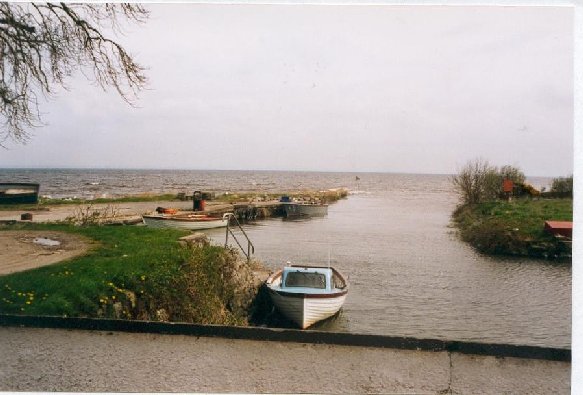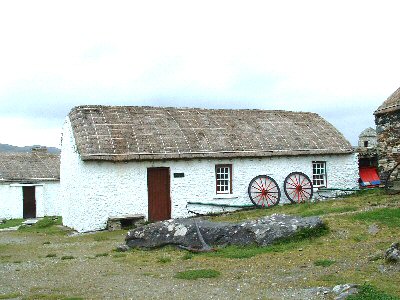The story of unwilling Irish emigrants to Canada
If you check on Google Earth, you will find that St Bride’s,
It is about sixty miles west of the border with
The essay we are about to serialise tells the story of an Irish family’s departure in the early years of the last century for eventual settlement in that remote locality. There are numerous pointers to indicate that these Quinns may be related to your editor. Though I must admit this to be one reason I have ventured to include this donated story on Journal, I suspect that the higher percentage of our American readership (which constitutes the simple majority of the total) will at least empathise with the unwilling migrants and ‘keen’ with me over the American Wake.
Farewell to Ardboe – by Michael Quinn
‘I well remember the morning we left Ardboe for
The previous evening my father and I walked the short distance to say goodbye to his mother – my grandmother – whom I had always known as Old Eliza.
Old Eliza and my grandfather, Old Felix had always lived on the

We walked in silence along the cobbled road in the gathering dusk of an evening in early spring, with me taking little runs to keep up with him, for he was a great walker with long, swift strides. We turned left at the stile and continued down the loanan towards the lough. As we approached it I could hear the waves whispering along the shore, as I knew it lapped too at the base of the mound nearby, with its ruins of the ancient Abbey, its crumbling tombstones, and its High Celtic Cross with the cloven-hoofed stone at its base, that gave the place its name. Ard Bo, great cow – the source of many local myths and legends. I was born in its shadow.
The house seemed different, I thought. Although it was a warm evening there was a turf fire burning brightly on the hearth, the flames throwing dancing shadows on the walls. My grandmother was upright by the window, leaning on her blackthorn stick, as if she had been waiting for us. Her snow-white hair – I noted the colour as if seeing it for the first time – was gathered up in a neat bun at the nape of her neck. She had a knitted black shawl drawn tightly around her thin, stooped shoulders.
Old Felix was seated in his usual corner, gazing intently at the glowing embers, a short-stemmed clay pipe in his large gnarled hand.
Mark and John, two of my uncles, acknowledged our arrival with a glance and a nod. Mark continued to repair a fishing net he was working on and John was re-filling his brier pipe.
Old Eliza shuffled back and forth between the hearth and the kitchen table, making tea. Hardly a word had been spoken but this was not unusual in itself. Among themselves they were not a talkative people. Now they were all preoccupied with their own thoughts. The flames made little plopping sounds as they licked at the dry turf. A cricket, that made its winter home in the side wall of the fireplace – misled, from the heat of the firebricks into thinking that summer had arrived – commenced chirping to attract a mate.
‘So. Yous are away th’ morra’,
said my grandmother as she leaned over a large iron cauldron from which to ladle hot water into a brown teapot.
It was a statement rather than a question. In contrast to her frail body, her voice was strong. Unwavering. It carried a note of resignation. It expressed the dutiful philosophy of a woman who had long ago learned to accept – without quibble – the inevitable.
She was about to lose her last born – her favourite of them all.’
… Leaving Old Eliza …
